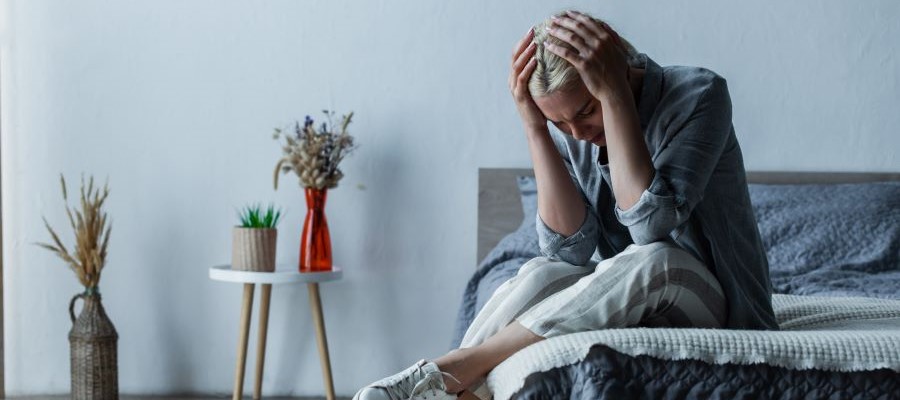
How Menopause Affects and Changes Sleep
During menopause, women can experience poor, disrupted sleep. Hot flashes are among the most common side effect, but sleep can be affected by other sleep disorders that may impact both nighttime and daytime quality of life.
Women face a large array of hormonal, physical, and psychological changes during menopause. Some women experience mild menopausal symptoms while other women struggle with very severe symptoms, requiring medication. Menopause related sleep disturbances can exacerbate other symptoms of menopause.
Phases of Menopause
There are three phases to menopause – perimenopause, menopause and post-menopause. Perimenopause, or the transition phase, happens over several years during which a women’s ovaries produce less and less estrogen and progesterone. About a year after menstrual periods have stopped, a woman reaches menopause. Post-menopause, or the years after menopause, tend to ease menopausal symptoms, such as hot flashes. However, women in this stage of their lives are also at an increased risk for other health conditions, such as osteoporosis and heart disease.
What are hot flashes? And how do they affect our sleep?

Many women associate hot flashes with poor sleep or sleeplessness at night. Hot flashes, described as waves of intense heat, can happen day or night. While asleep, hot flashes are often connected to nighttime awakenings.
However, while it may feel like you’ve awoken due to a hot flash, research has shown that it is usually just before a hot flash that menopausal women wake up. This is likely due to the changes in the brain that prompt an awakening, not just the sensation of heat itself.
Other sleep disturbances during Menopause

As women experience a loss in reproductive hormone production, such as estrogen and progesterone, they may be at a higher risk to develop sleep apnea. Women also tend to experience milder symptoms of sleep apnea than men and are less likely to seek a diagnosis.
Menopausal women are two- to three-times more likely to develop sleep apnea than pre-menopausal women. The symptoms and effects of sleep apnea also overlap with symptoms of menopause itself, such as fatigue, making it that much harder to recognize the need for evaluation and treatment.
Restless Leg Syndrome
Another symptom of menopause that can cause sleep disruptions is Restless Leg Syndrome (RLS), an uncomfortable sensation in the legs accompanied by an overwhelming urge to move them. These sensations can occur whenever someone is inactive for a long period of time but symptoms are the most severe at night when someone is resting, usually lying in bed. RLS can make it difficult to fall asleep or return to sleep when woken by its symptoms. It can help to get up and walk around however the relief may only last as long as you are moving. As many as 10% of the US population may have RLS and it is more common among women. Although young people may develop RLS, it tends to affect the middle- and elder-aged populations and symptoms can become more frequent and severe as you age. There are non-drug therapies as well as medications to treat RLS. Be sure to consult with your doctor to find the best treatment for you.
Read also: Restless Leg Syndrome (RLS): Causes and Treatment
What can I do to get better sleep as I age?

It is still possible to get a good night’s sleep as we age! Adults, even into our golden years, need about 7 hours of sleep at night. Seniors tend to go to sleep earlier in the evening and wake earlier the next morning but getting a full night of quality sleep is just as important as we age.
If you are experiencing trouble falling or staying asleep, there are several things you can try to see what works best for you.
To begin, make sure you have a good foundation by:
- Exercising regularly, preferably earlier in the day
- Eating a healthy, well-balanced diet
- Reducing stress
- Following a regular sleep schedule – go to sleep and wake up at the same time each day
- Avoiding late afternoon/early evening naps
- Establishing a relaxing bedtime routine – this may include a warm bath, listening to music or having a cup of soothing tea.
Read also: Best Natural Remedies for a Good Night’s Rest
Hormone Replacement Therapy (HRT)
If you’re finding lifestyle changes fall short of helping you get better sleep, you may consider Hormone Replacement Therapy (HRT). HRT – taking medications to replace the female hormones that your body is no longer producing – can lessen menopausal symptoms and prevent osteoporosis.
There are different types of hormone therapy and depending on the type, dose, when you start the therapy and duration of treatment, the benefits vs. risks can vary greatly. It is important to work closely with your doctor based on your individual symptoms and risk factors and communicate regularly to make adjustments throughout your menopausal and post-menopausal years.
Cognitive Behavioral Therapy (CBT)
Cognitive Behavioral Therapy (CBT) is another form of therapy to consider. It can help to reduce menopausal symptoms, including changes in mood, anxiety and sleep disturbances. Research shows that CBT can give women the tools to manage hot flashes and night sweats which can reduce bouts of insomnia that are related to menopausal symptoms. It is a non-hormonal therapy which makes it a safe and effective therapy option.

Dietary Choices
Isoflavones, found in high doses in soybeans, chickpeas, fava beans, peanuts, pistachios, alfalfa as well as some fruits, nuts and beans, have estrogen-like effects which is thought to contribute to fewer occurrences of hot flashes. Soy supplements may not be suitable for women who have a personal or family history of breast cancer or are already undergoing hormone therapy. Discuss your specific symptoms and medical history with your doctor before beginning any new treatment options.
Other non-hormonal options include yoga, massage, acupuncture – these forms of exercise and treatment can have a greater effect on your health in addition to helping to reduce uncomfortable menopause and post-menopause symptoms.
Read also: 12 Tips on How to Fall Asleep Right Now
Good sleep is still possible!
Menopause is a natural part of aging for women and is not a disease or disorder. Other changes in our bodies during this time increases certain health risks so it is important that we are pro-active in our decisions to protect our health and well-being. While no two women will experience the exact same symptoms during this phase of their lives, getting a good night’s sleep is a significant first step to enjoying an active and healthy lifestyle into your golden years.
